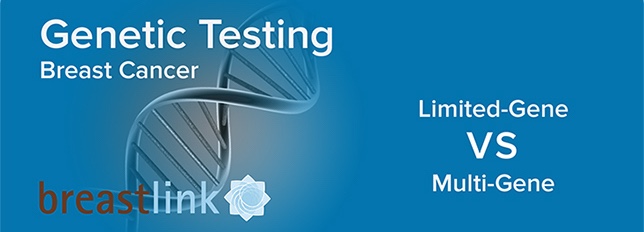The landscape of testing for hereditary cancer predisposition genes has been in rapid evolution. Recently developed tests can evaluate up to 43 genetic mutations associated with increased risk for a variety of cancers including breast cancer. Using data collected from our clinics, my Breastlink colleagues and I have analyzed how safe and effective these newer multi-gene tests are in comparison to previous methods of genetic testing.
The Development of Multi-Gene Tests for Breast Cancer Risk
Two key events have helped change the face of genetic testing:
- Technology became so advanced with next generation sequencing that it became as simple to evaluate 10 genes at once as it was to evaluate a single gene.
- A 2013 Supreme Court decision, ruled that patents cannot be held on naturally occurring human genes. Patents on BRCA1 and BRCA2 (BRCA1/2) genes had previously restricted a women’s choice when it came to genetic testing.
Approximately 10% of breast cancers are thought to be caused by inherited genetic mutations. Mutations in BRCA1/2 account for about one-half of these. However, numerous other breast cancer-related genes can also increase risk and cause breast cancer. The earlier practice of patenting genes required women to receive initial evaluation of BRCA1/2 followed in sequence by individual testing for other breast-cancer related genetic mutations.
Comprehensive multi-gene tests that evaluate beyond BRCA1/2 are more cost-effective and less time consuming than limited-gene tests. Our data show that they are also as effective as limited-gene tests at detecting BRCA1/2 mutations.
Breastlink Study Results: Multi-Gene Vs. Limited-Gene
Breastlink recently analyzed data on 966 patients who had received genetic testing based on National Comprehensive Cancer Network (NCCN) guidelines. Multi-gene tests were administered to 337 patients and limited-gene tests to 337 patients. Limited-gene tests evaluated BRCA1/2 genes only. Multi-gene tests evaluated between 5 and 43 genes, including BRCA1/2. An average of 14.7 genes were evaluated in the multi-gene group.
Among patients receiving limited-gene tests, 4% tested positive for BRCA1/2 pathogenic mutations (mutations known to increase risk of breast cancer). Among patients receiving multi-gene tests, 3.6% tested positive for BRCA1/2. On a multivariate analysis, controlling for patient variables and family characteristics of cancer history, there was no significant difference in the rate of detecting a BRCA1/2 mutation between the group of patients undergoing limited BRCA1/2 testing alone to those receiving a multi-gene panel test.
More importantly, an additional 3.9% of patients in the multi-gene panel group tested positive for other genetic mutations known to increase risk of breast cancer. A total of 7.5% of patients receiving multi-gene tests tested positive for a pathogenic mutation compared with 4% of patients receiving limited-BRCA1/2 tests alone.
An additional 13.6% of patients in the multi-gene group received results showing non-BRCA1/2 variants of uncertain significance (VUS). VUS indicates a change in the DNA sequence that is not fully understood. The overwhelming majority of VUSs will turn out to be benign, and not show any correlation to cancer risk nor impact any treatment decisions. Until we do more testing of these less-known genes, however, we will see a higher rate of VUSs with multi-gene testing. There was no significant difference in the detection of BRCA1/2 VUSs between the two groups.
Among patients in the multi-gene group testing positive for genetic mutations, 48% tested positive for BRCA1/2 mutations and 52% tested positive for non-BRCA1/2 mutations. Non-BRCA1/2 genetic mutations known to increase risk were most commonly seen in:
- PALB2 (23%)
- CHEK2 (15%)
- ATM (15%)
- MUTYH (15%)
- MRE11A (8%)
- MSH2 (8%)
- NBN (8%)
- TP53 (8%)
These results suggest multi-gene testing is as effective in the detection of BRCA1/2 genetic mutations as limited-gene testing.
Additionally, multi-gene testing doubled the total detection rate of genetic mutations known to increase cancer risk.
Dr. Kapoor's American Society of Breast Surgeons (ASBS) presentation.
What Do These Results Mean?
Results from data collected at three Breastlink clinics show several benefits to multi-gene testing. In addition to being more time- and cost-effective than limited-gene tests, multi-gene testing:
- Effectively evaluates BRCA1/2 genes AND other breast cancer-related genes.
- Empowers women with more information about their risk.
- Provides clinicians and researchers with information to improve our knowledge of breast cancer biology.
While there have been concerns about the accuracy of multi-gene tests, these results help to address some of this confusion. Women considering genetic testing for breast cancer risk can benefit from more timely and efficient genetic testing. Results from multi-gene tests can help women with both BRCA1/2 and non-BRCA1/2 genetic mutations to take preventive measures.
Hereditary and genetic cancers are complex and not fully understood. The medical community is still unsure of the ways certain genetic mutations affect risk and protocols for dealing with these are not yet in place. However, multi-gene testing provides useful clinical information that enhances our knowledge of these cancers. This is a step toward the development of more effective targeted therapies.
Doctors are the gatekeepers to genetic testing. We have an obligation to help patients understand genetic risk and how testing can guide decisions about their health. At Breastlink, we can help you to better understand personal risk factors, whether genetic testing is appropriate and how to proceed depending on your results.
For more information, please contact us.




Add new comment